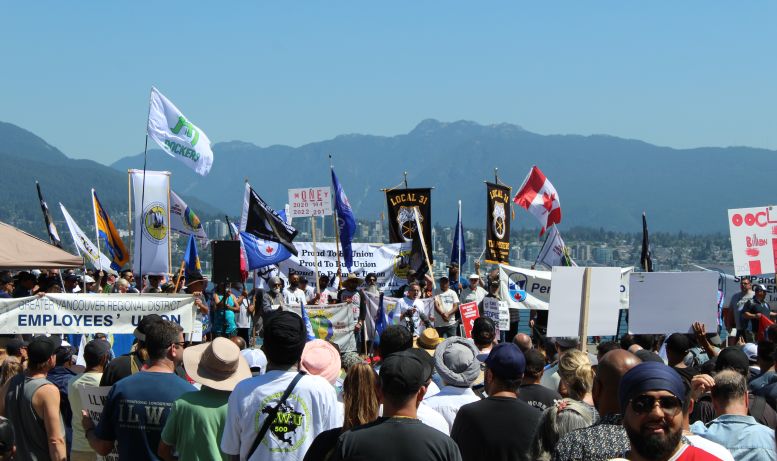Written by Socialist Alternative members in solidarity on the picket line.
On Wednesday, July 19, the leadership of International Longshore and Warehouse Union Canada (ILWU) changed their position on their legal strike multiple times. In the morning they announced they were suspending the strike, after restarting it the day before, only to announce a few hours later that they have given 72-hours’ notice to restart it on Saturday, July 22. They then called it off again in the afternoon.
All this follows the federal government’s interventions in the strike on behalf of the employers. The federal Liberal’s Labour minister O’Regan early on July 19, declared the ILWU strike “illegal,” after the Canada Industrial Relations Board (CIRB) found it “unlawful.” The union lifted the pickets for 72 hours until Saturday morning, to give “legal” strike notice.
This is the second time in a week that the federal government has intervened in the ILWU strike on the side of the bosses. On July 11, O’Regan instructed the federal mediator to present terms for a settlement of the strike. On July 12, he gave ILWU and the employers (BCMEA) 24 hours to accept or reject his proposals, which leaned to supporting the employer (see main article below). The ILWU “suspended” the pickets while it decided on the tentative agreement. The ILWU states that “Canadian labour law holds that a strike continues from the moment of job action until the ratification of a collective agreement.” The CIRB and O’Regan ignored this, instead acting again on behalf of the employers.
Amazingly, on the same day as the pickets re-started at 4:30 pm on July 18 the CIRB, after a request from the BCMEA, held an urgent hearing and later decided against the strike.
When a union complains about unfair practices it can take years for the courts to reach a decision, long after the dispute is over. In 2002, the BC government changed the teachers’ contract, but it was not until 2016 that the Supreme Court decided the government’s actions were illegal. Unions need to rely on their collective power, not the courts and government, who lean to supporting big business.
While technically the government has not brought in back-to-work legislation, they have clearly intervened in the strike and done so in favour of the employers. It is a legalistic slight of hand by the Liberals showing, in spite of their words, that in practice they do not support the right to strike, if the strike is effective, such as this one, the Montreal port strike in 2022 or postal workers in 2018.
A clear lesson from the government’s intervention is do not lift the pickets while deciding on an agreement. The employers and the government have made it clear they view that as ending the strike.
There is no indication from either the government or the employers that they have put forward an improved offer for the union to consider. Instead, it is highly likely, given the government’s track record, that during today it again applied pressure and perhaps threatened the union after the ILWU announced the resumption of the suspended strike. If this is the case, the union should shout it from the rooftops to tell all the labour movement what the government is doing.
This on-off-on-off-on-off-? strike risks confusing and dividing the membership. The ILWU needs clarity and determination to unify the membership, which was so powerful when the members voted 99.24 percent in favour of strike action just five weeks ago.
It is imperative that the union stiffens determination so that when the strike restarts, it is solid and able to stand up to whatever new dirty tricks the employers and government may try.
This is a struggle for the entire labour movement and working class.
ILWU Strike Back: July 18
The longshore strike in BC is back. The delegates representing the members of the International Longshore and Warehouse Union Canada (ILWU) rejected the tentative agreement that the federal government’s mediator had proposed and was recommended by the bargaining committee. The strike restarted at the change of shift at 4:30 pm on Tuesday, July 18, after a pause of 5 days. Pickets were back across BC.
Such is the determination, that by 3:30 pm dozens of workers had already gathered at the East Vancouver picket line with the shade tents up and the barbeques going. Many workers expressed firm resolve; the tentative agreement did not measure up. It did not address the members’ needs, especially on job security for younger workers, threatened by the contracting out of maintenance work and a major increase of automation that would shed jobs.
Socialist Alternative had members on the picket line by 3:30 pm, with 11 overall attending as our members finished work. The pickets we talked to today were more determined than ever. An older worker stated he was retiring soon, but he was fighting for his children and the whole next generation. Younger workers, casuals who do not yet have the full pay the employers go on about or seniority, stated they are struggling to survive on the current wages. A younger woman casual said the only way we can win is to fight.
Employers Whining
Not surprisingly, big business and their political lackeys, such as Premiers Scott Moe of Saskatchewan and Danielle Smith of Alberta, are screeching that the federal government needs to legislate against the strike.
The BC Maritime Employers Association (BCMEA) has whined that the strike is back without a vote of the full membership. They never complained when the negotiating committee of ILWU, a much smaller and less democratic body than that of the delegate caucus, lifted the strike before the agreement was ratified.
The full details of the proposed agreement have not been released, but from the information available, clearly the mediator supported the employers more than the longshore workers, agreeing to the bosses’ proposed four-year contract (the workers wanted a two-year contract given the volatility of the economy) and wages, signing bonus and retirement fund proposals closer to the employers. The BCMEA claims the agreement is “fair and equitable” and that by rejecting it the union is risking Canadian livelihoods — crocodile tears!
But nowhere are the wages of ILWU members compared to the owners’ profits. A report by labour economist, Jim Stanford, shows that five of the six biggest global shipping lines (the sixth, MSC, does not produce public accounts), which all are members of the BCMEA “made over $100 billion in profits in 2022 — up 1500% since 2019.” These profits come from the labour of workers including ILWU Canada. Robin Silvester, head of the Vancouver Fraser Port Authority in 2022 received $1.68 million that year. Neither Silvester or the shipping companies’ owners risked their lives during COVID or by going to work every day.
There has been no public mention of any solid guarantees of job protection, one of the core concerns of union members.
Unity and Solidarity Needed
ILWU’s negotiating committee has misjudged the members’ mood and made a mistake to lift the pickets before the delegates had time to discuss the mediator’s proposals. Socialist Alternative wrote on July 14, “The lifting of the pickets before the members voted on the new contract … is pre-empting the union’s democracy and the rights of the members.” We warned that the “leadership of ILWU in accepting the deal, if it does not deliver, risks dividing the powerful unity of the members.”
Now the unions’ wider leadership must make every effort to re-unify the membership to maintain the solid power of the first round of the strike and the 99.24 percent vote for the strike.
The federal Liberals may now use legislation. As we argued the ILWU has the strength to defy any such back-to-work rules. Ontario’s unions forced Doug Ford to retreat in 2022. The container truck drivers in the Port of Vancouver successfully defied threats of legislation in 2014. There are not thousands of skilled scabs waiting to do the work of longshore. No one would trust an untrained worker to drop a full steel container weighing up to 25,000 kilos onto a truck, train or ship.
At the mass ILWU rally on Sunday, July 9, there were many determined and powerful speeches. The ILWU in the US, the BC Federation of Labour and Canadian Labour Congress all gave support. In the next days those words of solidarity may not be enough, they will need to be turned into action. “An injury to one is an injury to all.”
“They Don’t Like Us, We Don’t Care”
A common ILWU chant, in reference to the bosses, is “They don’t like us, we don’t care.” This clear class insight is based on the over a century of bitter struggles, with lives lost, to build the ILWU in the teeth of the bosses’ resistance. It took several attempts to unionize the docks; the bosses used scabs, police and vigilante thugs, and hunger to break several unions.
ILWU members, in contrast to so many of today’s “business” union leaders, know that being nice to the bosses gets nothing, it only encourages the bosses to attack.
A determined united strike of ILWU can win a victory, not only for today’s ILWU members, but for the wider working class and future generations of workers. An older ILWU member stated that “I’m not out here for me, I’m here to fight for the next generation and for younger workers.” This is a struggle of the wider working class. Solidarity, for victory!
Messages of solidarity: president@ilwu.ca
For reference here are the previous three Socialist Alternative articles on the strike:
- July 14 (Contracting out, federal interference, public ownership of docks: https://socialistalternative.ca/port-of-vancouver-truckers-successful-strike/
- July 7: (Automation, safety, employers not negotiate) https://socialistalternative.ca/solidarity-with-ilwu/
- July 1 (start of strike, profit-gouging companies): https://socialistalternative.ca/workers-close-bc-ports/



